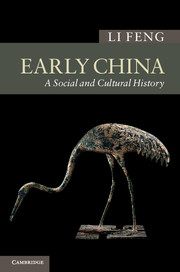Book contents
- Frontmatter
- Contents
- List of Figures
- List of Maps
- Preface
- Chronology of Early China
- Map
- 1 Introduction: Early China and its natural and cultural demarcations
- 2 The development of complex society in China
- 3 Erlitou and Erligang: early state expansion
- 4 Anyang and beyond: Shang and contemporary Bronze Age cultures
- 5 Cracking the secret bones: literacy and society in late Shang
- 6 The inscribed history: the Western Zhou state and its bronze vessels
- 7 The creation of paradigm: Zhou bureaucracy and social institutions
- 8 Hegemons and warriors: social transformation of the Spring and Autumn period (770–481 BC)
- 9 The age of territorial states: Warring States politics and institutions (480–221 BC)
- 10 Philosophers as statesmen: in the light of recently discovered texts
- 11 The Qin unification and Qin Empire: who were the terracotta warriors?
- 12 Expansion and political transition of the Han Empire
- 13 State and society: bureaucracy and social orders under the Han Empire
- 14 Ideological changes and their reflections in Han culture and Han art
- Index
- References
10 - Philosophers as statesmen: in the light of recently discovered texts
Published online by Cambridge University Press: 05 June 2014
- Frontmatter
- Contents
- List of Figures
- List of Maps
- Preface
- Chronology of Early China
- Map
- 1 Introduction: Early China and its natural and cultural demarcations
- 2 The development of complex society in China
- 3 Erlitou and Erligang: early state expansion
- 4 Anyang and beyond: Shang and contemporary Bronze Age cultures
- 5 Cracking the secret bones: literacy and society in late Shang
- 6 The inscribed history: the Western Zhou state and its bronze vessels
- 7 The creation of paradigm: Zhou bureaucracy and social institutions
- 8 Hegemons and warriors: social transformation of the Spring and Autumn period (770–481 BC)
- 9 The age of territorial states: Warring States politics and institutions (480–221 BC)
- 10 Philosophers as statesmen: in the light of recently discovered texts
- 11 The Qin unification and Qin Empire: who were the terracotta warriors?
- 12 Expansion and political transition of the Han Empire
- 13 State and society: bureaucracy and social orders under the Han Empire
- 14 Ideological changes and their reflections in Han culture and Han art
- Index
- References
Summary
The period from the birth of Confucius (551–479 BC) in the middle of the sixth century BC to the closing of the Warring States period in 221 BC is usually designated as the “Age of Philosophers.” Despite the ceaseless military conflicts staged by the large territorial states (analyzed in Chapter 9), China had at the same time also seen unprecedented intellectual developments with the Shi (discussed in Chapter 8) at the center of the stage. Those Shi who were able to systematically develop their theses, usually represented by a core group of texts, and in turn had them passed on to their disciples through the medium of private education were then remembered in history as the philosophers. The fundamental philosophical ideas developed by these late Spring and Autumn and Warring States period masters have since dominated the skyline of the Chinese intellectual life, and became the defining features of Chinese civilization over the next two millennia.
The phenomenon is interesting within the context of Chinese history and is also important for understanding the early development of the humanities in a global context. For this reason perhaps, the subject of early Chinese philosophy has always been at the heart of Western sinology. And this trend has only been increased with the discovery of critically important new philosophical texts from Warring States tombs, mainly in South China, over the past thirty years. It is obviously impossible to offer here a full discussion of the various propositions endorsed by the numerous philosophers and to trace the lines of their discourses across the extremely rich literature of the Warring States period, for which purpose good introductions have already been written. Instead, as a unit of a concise survey of early Chinese civilization the present chapter will focus on the process of formation of a few main philosophical traditions as a social and cultural phenomenon, along with the introduction of some fundamental concepts as their responses to the problems of their time and society. In this way, the chapter will also discuss some recent discoveries of philosophical texts and the significant new light they shed on the development of the early Chinese intellectual traditions.
- Type
- Chapter
- Information
- Early ChinaA Social and Cultural History, pp. 206 - 227Publisher: Cambridge University PressPrint publication year: 2013



